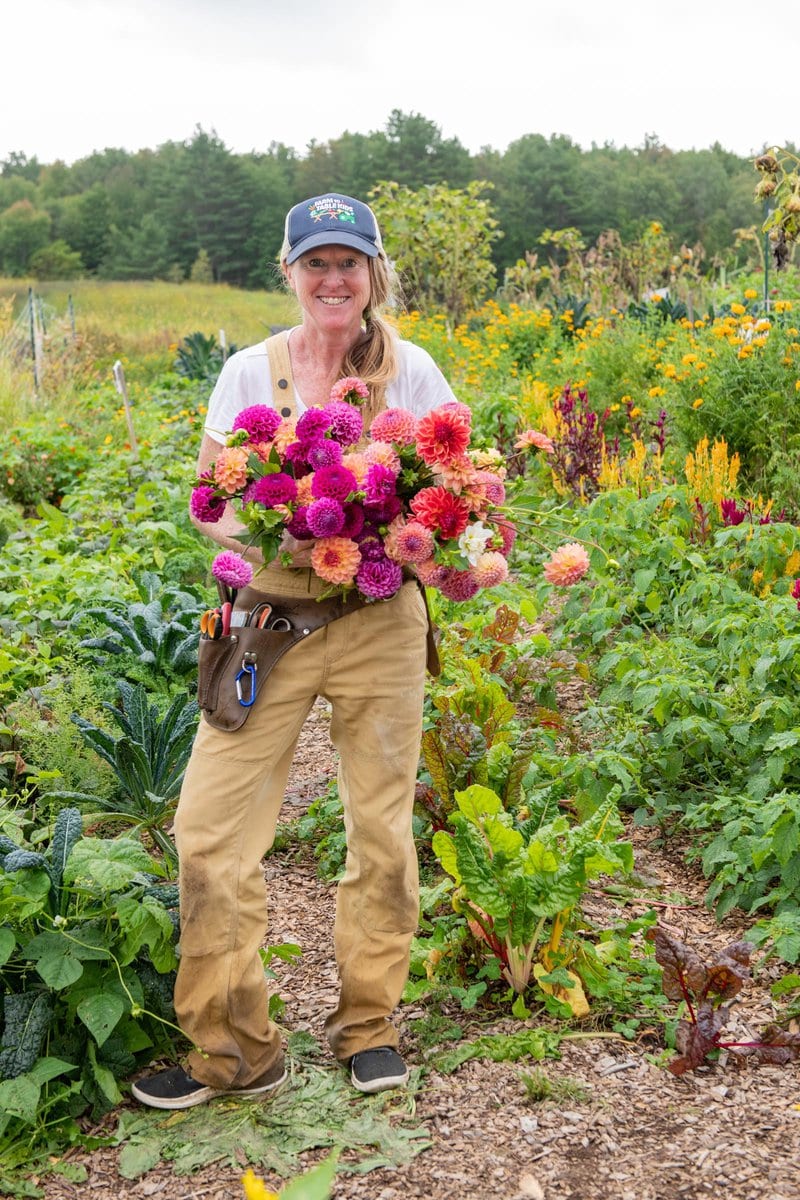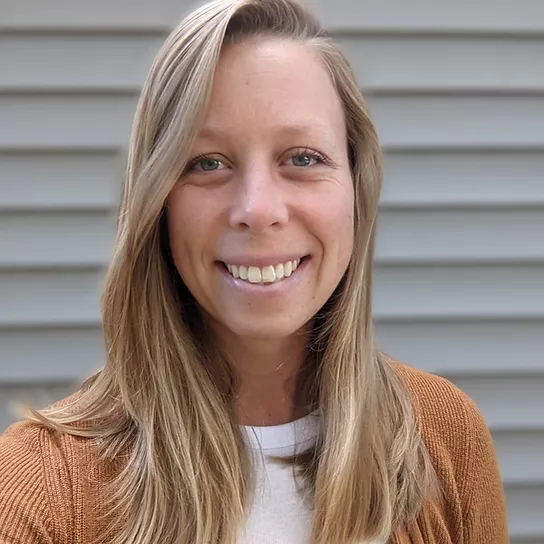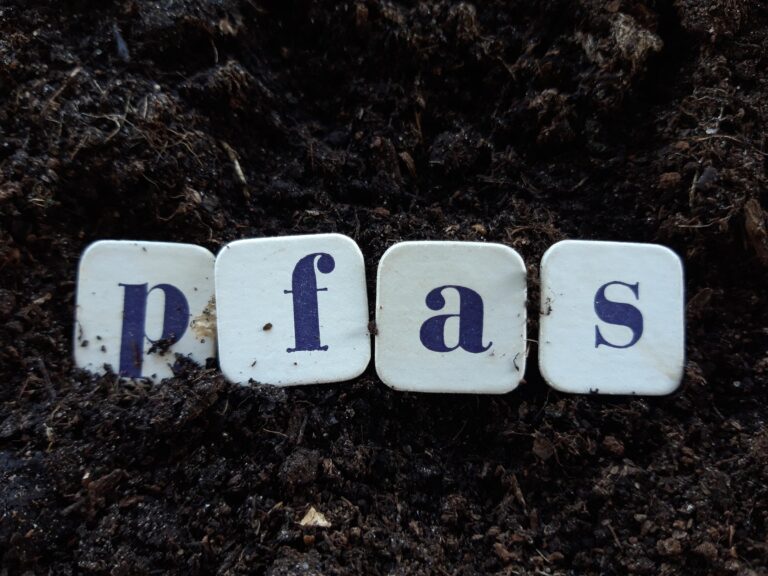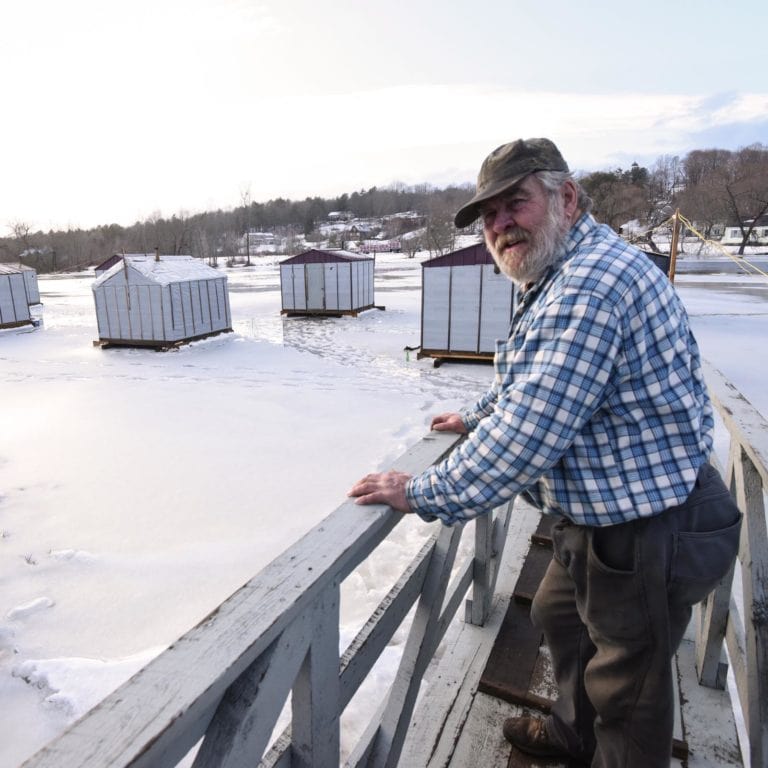Darting in and out of neat rows of flowers, Steph McDonough clips sweet peas and snapdragons, assembling an elegant bouquet in her hands. She spiritedly points out dinner-plate asters, craspedia sunballs, dahlias, feverfew, and zinnias as she breezes through her garden. As little as five months ago, this garden didn’t exist. Now, it bursts with color and hope for the future.
In December of 2021, McDonough abruptly lost the lease to the North Yarmouth farmland upon which she operated her business, Farm to Table Kids. She had to change or cancel much of her 2022 programming. Transforming the backyard of her Cumberland home into a small but abundant flower farm is just one of the ways McDonough is forging ahead with optimism and fierce determination to fulfill the mission of this nonprofit: to help children find what lights up their hearts through organic farming, farm-to-table cooking, and nature crafting.
McDonough may seem naturally cheerful as she navigates these challenges, but her optimistic outlook is upheld by choice—she’s no stranger to life’s trials. In 2015, her young son was diagnosed with stage four cancer. She and both of her kids left Maine and lived in the hospital in Massachusetts for two years while her son received treatment. When he recovered and the family returned to Maine, McDonough felt removed from the community and her farm work. “I had with me my two kids, two broken wings, and divorce papers,” she says.
“I knew I needed to find light again because I knew what it felt like, and I knew it was missing.”
McDonough focused her energy on opening a summer farm camp for kids. She obtained every certification, license, and permit required for a childcare venture, secured a farmland lease, and launched a three-week trial camp. Immediately successful, the camp grew exponentially. By 2019 McDonough was offering 10 weeks of summer camp, April vacation camp, Earth Day celebrations, and year-round school visits and adult workshops. The farm provided food at school salad bars and local restaurants, including Bissel Brothers in Portland and The Garrison, Gather, and Thoroughfare in Yarmouth. “We were knocking it out of the park,” she says.

In 2019, the camp’s momentum also yielded an educational partnership with MSAD 51, the school district comprising Cumberland and North Yarmouth in which Farm to Table Kids became an alternative classroom. Designed for students who learn better outside, the class let participants from Greely High School earn graduation credits by volunteering at the farm. The resulting produce was served in the school cafeteria’s salad bar—where kids, recognizing their handiwork, eagerly ate their vegetables.
“It feels great to see so many students loading their plates with fresh fruit and veggies,” says Molly Costable, MSAD 51’s assistant food service director. “The variety of what we [could] purchase from [Steph] is so special for our students. They [don’t] see snacking peppers or yellow tomatoes from the big distributors.”
By 2021, the partnership had expanded even further. Seniors taking cooking classes visited the farm to learn about and harvest vegetables for their recipes. And McDonough, donning the moniker “Farmer Steph,” visited the school every spring and fall to teach students about growing seeds and eating healthy foods.
After years of building this robust array of programs and partnerships, McDonough responded to the loss of her farmland at the end of 2021 by casting a wide net and remaining optimistic. “[Experiences like this] really make you think: ‘What do you want? What’s important to you?’”
For her, the answer was easy: teaching farming to kids.
“I love lighting kids up in nature,” she says.
For McDonough’s students and their parents, the love is mutual. “There are no rainy days when you’re around Steph, even if it’s raining,” says Freddie Daniel, a Yarmouth resident whose three daughters attended farm camp. Daniel stands in awe of the amount of knowledge her kids brought home and applied to their own garden, and she remains hopeful that Farm to Table Kids will return in a new iteration. “She has an enormous amount of support from the community. [We] see the value in what she provides,” Daniel says.
For the time being, because she can no longer host students and families at her farm, McDonough plans to bring the farm to the kids. She’s developed STEM-focused classes and workshops held at the Maine Children’s Museum and in local preschools and elementary schools. And she’s working on a farm curriculum that would be a part of mainstream science classes for all 7th graders within the MSAD 51 school system. This curriculum revolves around growing dahlias, whose life cycle aligns well with the school year. If the plan comes to pass, the students will plant the dahlias before they leave school, with a garden club tending them over the summer. In the fall, the student will sell the flowers as a school fundraiser. Once a couple of frosts hit, they’ll dig up the tubers, learning how to split and store them, so the new 7th graders can try their hand cultivating dahlias the following spring. “It all cycles through,” says McDonough.

McDonough hopes to write a book in which she can share her deep understanding of how to farm with kids. She also plans to start a capital campaign so that, when the perfect property presents itself, Farm to Table Kids can purchase its forever home: a place for afterschool programming, camps, and homesteading classes. “I never want to stop empowering kids [to farm], and so I know I need a space to flex that muscle,” says McDonough.
For more information, go to farmtotablekids.org.














